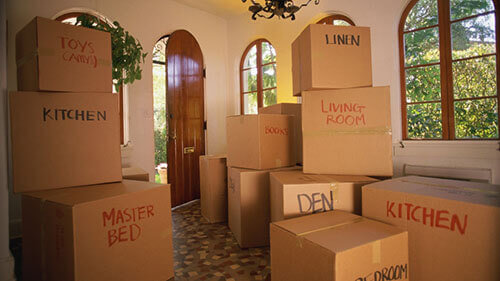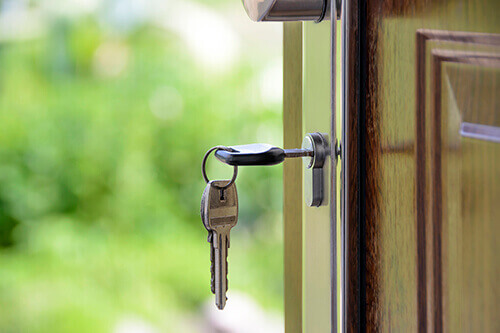
The Essential Moving Checklist
How many steps are there to moving? The more you think about it, the more steps there seem to be. From the day you decide to move until well after you’ve settled into your new place, you’re bound to think of new things that you wished you’d thought of sooner. And while we can’t guarantee we can help you cover everything that will inevitably come up, at College Hunks Hauling Junk and Moving, we’ve come up with the Essential Moving Checklist to help get rid of most of your moving stress.
This helpful list includes steps to take if you’re moving from one apartment to another, if you’re moving houses, and if you’re making a long distance move. We hope this detailed and comprehensive list will help relieve some of the stress of moving, and help you catch some of those “oh crap” moments before they happen.
The College Hunks Essential Moving Checklist:
2 Months Before Move:
- Purge and Declutter. Get rid of things you don’t want/need/use anymore. Shred and dispose of old paperwork, throw out all broken or damaged items, and then decide what you want to try to sell and what you’d like to donate.
- Research Movers & Get Estimates. We recommend you get quotes from at least 3 reputable moving companies — including College Hunks! — if you decide you need movers. Do your research online, but also get recommendations from friends and family members, and check out the companies’ BBB ratings. You want to get a good deal, but you also want someone you can trust with your items. Make your choice and hire a moving company no less than 1 month before you move.
- Start looking at new doctors/dentists/child care/etc. in your new area. You’ve probably already checked out the school system near your new home, but what about the local dentists? You’d be surprised how many people forget this step, so you might as well get it out of the way now. If you’re moving out of city or out of state, or even just to a different part of town, it’s important to find new doctors, dentists, and childcare in your new area. Handling this now can help should you need those services on or shortly after moving day.
- Collect records and important papers, including: medical, legal, school, etc. Get copies of any medical, dental, legal, and school documents you’ll need when you transfer your services to your new area. If you already have your new doctor and school selected, you might be able to have the items transferred directly there, but it’s always a good idea to have copies — just in case.
- Inventory items. Make an inventory of the large and bulky items you won’t be able to stick in a box. Thinks like furniture, appliances, bikes, lawn equipment, sports equipment, artwork should be listed and detailed somewhere. This list will be helpful when getting accurate quotes from moving companies. Some offer an in-home inspection for the best quotes, and having this list will be helpful then too.
- Start packing out of season items. If you’re moving in the summer, you probably won’t need your snow boots and skis right now, so you might as well pack them. And you probably won’t need your beach towels and tank tops right away if you’re moving during winter. The earlier you start packing, the less stress you’ll have towards moving day. So get started with out of season items. And make sure you LABEL EVERYTHING. It’ll make unpacking significantly easier. You don’t want to get to moving day and have NO idea where your toilet paper is — do you?
- Find out when you need to give notice. If you’re in an apartment, make sure you know exactly how much time you need to give your landlords, and if you need to sign anything to solidify that. Most places require a 30 day notice in writing to avoid any penalties, but some places request a 60 day notice, so make sure you know exactly when to give notice.
- Transfer renters or homeowners insurance. Contact your renters insurance or homeowners insurance company early and let them know when and where you’re moving so that you can be covered at your new place as soon as you move in, and that you’re not covering your old place any longer than you need.
- Research vehicle relocation companies, if needed. If you’re moving a long distance, and you don’t plan on driving your car the whole way, you’ll need to find a reputable company to transfer your vehicle. Your moving company may offer vehicle transfer services, but not all do, so do the same research you did for your moving company to ensure your car makes it to your new home.

1 Month Before Move:
- Start packing rarely used items & decorative things. As you get closer to moving day, start packing things you don’t use very often, as well as decorative items. Leave the items you’ll need over the next month for later, but things like books, movies, pictures, and so on can find their way into boxes now.
- Inform services of impending move, including: Post office, banks, financial resources, credit cards, employers, subscriptions, insurance agents, cell phone provider, utility companies, internet and cable providers. Setting up your cut off, turn on, and transfer services at least two weeks before your move will help make things easier on the day.
- Schedule any needed travel arrangements including: airfare/bus fare/trainfare, hotel, babysitting, pet sitting, plant sitting, pet rock sitting. Get everything squared away so you don’t have to worry about it later. Make copies of every receipt and confirmation and put them somewhere safe.
- Get your vehicle serviced, especially if you’re going to be driving any kind of distance with it. You don’t want to have to deal with a shredded tire halfway between your old home and new home. So take your car for a service to make sure everything is in top working order before you hit the road.
- Start using up your perishable foods. Even if you’re only moving down the street, start using up your perishable — read: refrigerated — items now. Make your move easy without having to worry about something spoiling in your car because you forgot it in the trunk.
- Schedule donation pickups, yard sales, etc. to get rid of unwanted items. You already made a list of things you don’t want to take with you to your new home, so now is the time to actually get it out of your home. Schedule someone — like us! — to take your donated items away, hold a garage or yard sale, or start selling your items online and get them out!
- Make any repairs necessary. If you’re selling your house and the terms of your sale depend on certain repairs being made, get them out of the way as early as possible. Similarly with your apartment — you’ll need to leave it in the same condition you found it, so make sure that you finish all repairs, and fill in those nail holes too.
- Ensure all repairs are made on your new house. On the flip side, make sure that the previous owners of your new home fix everything they promised to fix as well.

2 Weeks Before Move:
- Pack all non-essential items. Decide what you need to last to moving day and pack everything else. How many plates, bowls, hair products, clothing, towels do you need to get through the next two weeks? Set that aside and get everything else into boxes.
- Confirm all moving services. Make sure everything is still good and ready to go with your moving company for moving day. It’s unusual, but sometimes things happen and confirmations can get lost or scheduled wrong, so now is a great time to make sure the right services show up when and where they need to be.
- Start Cleaning. You want your new place to be clean and pretty when you move in, so why would you leave your old home any different? Especially if you have a deposit riding on the state of your apartment, cleaning is essential. Start cleaning now and it’ll make things easier as you get closer to the big day.
- Request time off work, if needed. Moving can be a big thing, especially if you’re moving any kind of distance or if you have a large number of items. Make sure you take the time off that you’ll need to get yourself moved and settled into your new home. You don’t want to have to spend time after work trying to find your pots and bowls, so take some dedicated time to move. You’ll be glad you did later.
- Start making a folder or binder of critical information for your old home’s new owner. Does your old home security system have some unusual quirks? Does the bedroom’s window stick in the winter? Are there any things you’ve learned about your house over the years that you wished you had known before you moved in? Make a folder or binder of all those things so the new owner can have a head start.

1 Week Before Move:
- Finish packing, and make sure you label everything. Now is the time to pack the remaining items in your home. If you haven’t been labeling as you packed, make sure you do now. Include which room each box belongs, and if you remember, a list of things each box contains. It’ll help you find the items you want and need right away.
- Set cleaning supplies aside in an easy to reach area. You’ll need to continue cleaning your old home as you pack, but you’ll also want to clean your new home before you unpack your stuff. Your new bathrooms and kitchen should be cleaned first before your stuff gets there, so make sure you’ve got all your cleaning supplies handy. Put them in a clear tub so you can find them easily on moving day.
- Schedule and complete a walk through with landlord/new owners. We know you want your security deposit back, so be home when your landlord does your final inspection/walkthrough. Doing it before your moving day will give you time to make any final repairs or changes. Same with a house — the new owners will do a final walkthrough to make sure all the repairs have been made. You don’t want to be dealing with this on the day before moving day — or worse, on moving day.
- Pull out cash for food and tips if you hire movers. Your movers are going to be working hard to get you from Home A to Home B, and they’ll deserve a tip. Pull out cash now so you won’t have to worry about it later. And let’s be honest — cooking won’t be high on your to-do list on moving day, so make sure you have cash on hand to order some pizza… especially if your friends and family “volunteered” to help on the promise of food.

1 Day Before Move:
- Prepare all appliances. Whether you’re taking all of your appliances with your or leaving them for the next owners/tennant, make sure you clean and prepare your appliances. Defrost your fridge and freezer, clean it, and remove any water. Drain the gas and oil from lawn equipment, grills, and other items to ensure none of it sloshes out and ruins your items during the move.
- Do a sweep of all your drawers, cabinets, storage areas, and other hideaways for missed items. Do you have a junk drawer where you throw coupons, scissors, screwdrivers, and pencils just in case you need them later? Did you clean out that drawer already? What about your medicine cabinet? Your garage cabinets? Your backyard storage shed? Walk through every room and space in your home and make sure you’ve got everything packed into a box.
- Gather all keys, garage door remotes, etc. You’ll need to give these to your landlord or real estate agent on moving day, so make sure you have them all handy. Collect spare keys from friends and family now so you don’t have to deal with it later.
- Walk through your new place and document everything. If you’re moving into an apartment or other rental situation, see if you can get in before you move in — either the day before, or before your moving truck arrives. Take pictures or video of your new place to document the condition of everything, from the floors to the doors to the appliances to the ceilings. Most apartment management companies will give you a form to fill out with any dings or damages that were present before you move in, but having your own photographic evidence will help if/when you move out. If the apartment is furnished, document the state of the furniture as well. Even if it’s a small thing like a thumbtack hole in the wall, make a note of it.

Day of Move:
- Do a last walk through of your old house/apartment and yard. Did you grab the rake? The hose? The sweater you were going to wear but changed your mind about? Walk your property and ensure that everything is in order before you leave. Now is also a great time to make sure the path from your home to the moving truck is clear and unobstructed.
- Give keys to landlord/real estate agent. It’s time to say goodbye. So lock up your now-empty home and hand over the keys.
- Leave a note with your new address so the new owner can forward your mail. You should have changed your address with the post office already (and Amazon), but just in case someone didn’t get the message, it’s nice if the new owners can send you your stuff.
- Test appliances, faucets, toilets, smoke detectors, etc. in your new home. In addition to seeing that everything is in working order, it’ll also tell you that the water and electricity have been turned on in your new home. Now you don’t have to spend half the day with the utility companies getting the lights working.
- Set up your beds first. Even if you get to your new home first thing in the morning, you’re going to be completely exhausted before the day is done, so set up your beds first. That way you can collapse right into them as soon as you feel tired. Plus, beds are the focal point of your bedroom, so it’ll make decorating easier. And it’ll start to feel like home faster.
- Sign and receive a copy of the bill of lading or inventory from your movers. If your stuff is leaving without you, be sure you sign and get a copy of all your moving paperwork before it takes off. Know exactly when it is scheduled to arrive, and double check that they have the right address. It wouldn’t be a bad idea to exchange numbers with the drivers, just in case something changes in the plan.
- Start unpacking. Start to feel at home by unpacking your stuff. Focus on your kitchen, bathroom, and bedroom stuff first, and any electronics that you can’t live without. If you have friends or family who can help, give them each a room to work on so everything gets unpacked faster. You can always rearrange things later, but your house will start to feel like home sooner if you get the boxes out of the way.
- Inspect furniture and appliances for damage. Moving companies do their best to protect your items — at least great ones like College Hunks do — but accidents can happen. If you find any damage, photograph it and contact the moving company as soon as possible.

After Move:
- Enjoy your new home. Welcome home.
